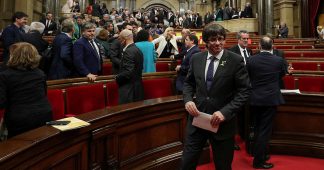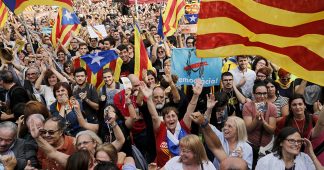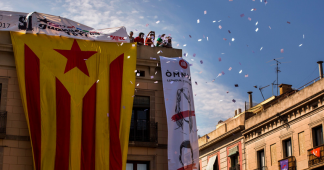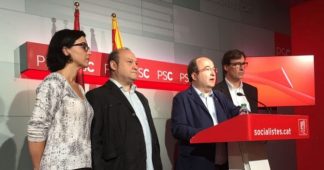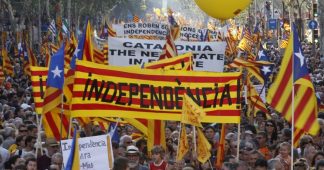By Dick Nichols
February 7, 2018
Links International Journal of Socialist Renewal
Early on January 30, Roger Torrent, speaker of the Catalan parliament that was returned at the December 21 elections, suspended that day’s session. It had been set down to elect outgoing president Carles Puigdemont as head of the new Catalan government.
The decision of Torrent, a leading member of the pro-independence Republican Left of Catalonia (ERC), came after the Spanish Constitutional Court had ruled two days earlier that the investiture of Puigdemont, in exile in Brussels, could not take place in absentia.
Moreover, as someone facing charges of “rebellion” and “sedition” he would have to get the permission of Supreme Court judge Pablo Llarena—author of the preventive detention of other Catalan MPs—to actually attend the investiture session.
Finally, if Torrent and the Catalan parliament’s speakership panel went ahead with the investiture session in violation of these conditions they would incur legal sanctions. In the words of the Constitutional Court’s ruling:
All these [members of the speakership panel] are advised of their duty to block or paralyse any initiative that would involve ignoring or evading the precautionary measures adopted. In particular, that they abstain from starting, processing, informing or enacting … any agreement or line of behaviour that would allow a debate on the investiture of Carles Puigdemont i Casamajo to proceed on terms that do not respect the precautionary measures adopted in the present ruling.
Torrent justified his decision to suspend the January 30 session on the grounds that he wanted to ensure a “real investiture” for Puigdemont.
Spectre haunting Madrid
If January 30 had been a normal investiture session, Puigdemont’s election would have been a formality. As leader of the party Together For Catalonia (JxCat) that had won the most seats within the 70-seat pro-independence majority, he had the support of the other pro-independence forces: the centre-left ERC and the anti-capitalist People’s Unity List (CUP). He also faced no rival from the 57-seat unionist minority of Citizens, the People’s Party (PP) and the Party of Socialists of Catalonia (PSC).
Even in the extraordinary situation of detention and exile for eight Catalan MPs and the Spanish government’s October 27 sacking of the Catalan government under article 155 of the Spanish Constitution, Puigdemont was still sure of a 68-vote majority in the 135-seat chamber. Two of the jailed MPs—detained outgoing vice-president Oriol Junqueras (ERC) and former Catalan National Assembly (ANC) leader Jordi Sànchez (JxCat)—would still able to vote in absentia while four others had already declined their accreditation as MPs and had been replaced by the next candidates on the JxCat and ERC tickets.
Only one issue remained unresolved: would Puigdemont be able to deliver his investiture address by video link from his Brussels exile or have it delivered for him by another MP? Or would he try to get back into the Catalan parliament by stealth?
On January 15, the legal counsel of the Catalan parliament delivered a majority opinion against investiture in absentia, but the final word lay with the speakership panel, on which JxCat and ERC have a four-three majority. If the panel had been free to rule that Puigdemont could be invested in absentia, then he would be, even though the unionist parties said they would immediately appeal such a decision to the Spanish Constitutional Court.
Days of panic
The prospect of Puigdemont—symbol of Catalonia’s independence struggle—returning as head of government panicked all wings of the Spanish establishment, beginning with the PP administration of prime minister Mariano Rajoy but including the opposition Spanish Socialist Workers Party (PSOE) and the new-right Citizens.
If the Catalan parliament backed Puigdemont as president how was he to be removed? On what grounds could Spanish King Felipe, embodiment of Spanish state rejection of the “illegality” of the Catalans’ cause, formally refuse recognition of their parliament’s decision? Could the ongoing support of the European institutions for Spain’s handling of its Catalan headache be guaranteed in such a situation?
The more the Rajoy government looked at the issue, the clearer it became that it had no choice: it had to mobilise the powers of the state to block the investiture of the man it was deriding as a “political zombie” even as it obsessed over how to exorcise him. Former PSOE leader and minister Alfredo Rubalcaba expressed this position in a January 26 interview on radio Onda Zero: “Puigdemont cannot be president and what we are discussing now is how to stop that at the lowest cost.”
To prevent the “zombie” returning by stealth, interior minister Jose Ignacio Zoido had the Civil Guard and Spanish National Police set up road blocks, check car boots, keep minor airports under surveillance and scour the sewers under the Catalan parliament. Civil Guard teams even entered French territory without permission to conduct searches.
On January 25, Spanish deputy prime minister Soraya Saenz de Santamaria, in charge of operations in Catalonia, announced that she was reversing the Rajoy government’s usual approach of waiting for the Catalan parliament to act before appealing decisions. It would instead seek the endorsement of Spain’s highest legal consultative body, the Council of State, for its support for a preventive injunction against Puigdemont’s investiture from the Constitutional Court, on the grounds that he was an “outlaw” lacking “liberty of movement”.
Yet, much to the horror of Rajoy and company, the Council of State recommended that they not go ahead with the injunction because it had no solid legal basis. If upheld by the Constitutional Court, that body would be taking upon itself the right to decide which elected candidates a parliament could and couldn’t appoint to positions of office after they had been elected and despite no objection having being made against them as candidates—a clear case of violating democratic rights and even perverting the course of justice.
Constitutional Court to the rescue
However, the Rajoy government ignored this advice and ploughed ahead with its appeal, with Saenz de Santamaria being reported as ringing up various Constitutional Court members to stress the vital importance of their decision.
According to media reports, the twelve-member court was split seven-five on whether to admit the appeal. To avoid further increasing the Rajoy government’s discomfort with a split ruling the court decided to postpone a decision for ten days—“to decide upon the admissibility of the appeal”—while at the same time spelling out the conditions on which Puigdemont’s investiture could theoretically still go ahead.
The Constitutional Court thus gave the Rajoy government what it wanted while dodging a decision on its legal application: Puigdemont could attend the investiture and end up in jail or stay in Belgium and make any investiture illegal. On January 30, the court rejected a JxCat appeal against its ruling while one of the PP’s most provocative spokespeople, Raphael Hernando, reminded speaker Torrent that “he has two children so knows what he has to deal with.”
The court’s decision, already criticised by numerous Spanish jurists (see here for comment by Barcelona law professor Ferran Requejo), will doubtless be appealed to the European Court of Human Rights, where its violation of the separation of powers and the sovereignty of the Catalan parliament will be laid bare. Not that Rajoy and Saenz de Santamaria care: their game is to force the pro-independence bloc to abandon Puigdemont and cop the humiliation of having Madrid determine who can and can’t be a candidate for president of Catalonia, irrespective of the vote of the Catalan people.
To close any remaining loopholes, on February 1 Spanish attorney-general Rafael Català announced that the Rajoy government would make use of legislation preventing anyone simply awaiting trial for “rebellion” from standing for public office.
At the same time, all the voices of Spanish centralism are competing to see who can produce the most “trenchant” characterisation of the man who won most support within the Catalan independence bloc on December 21. Some examples:
“We are talking about absurd megalomania.” (Spanish deputy prime minister Soraya Saenz de Santamaria, February 6)
“He’s stopping a government from forming, thinking only about himself.” (PSOE federal secretary Pedro Sánchez, February 6)
“He should stop behaving like an Indian [racist Spanish expression meaning play the fool] and realise his time is up.” (Albert Rivera, leader of Citizens, February 1)
Even Elisenda Alemany, spokesperson of the pro-sovereignty Catalonia Together-Podemos group in the Catalan parliament, supports Puigdemont stepping aside (February 6) if this is the price of recovering Catalan self-rule:
With symbolic gestures we will not succeed in recovering our self-rule nor in advancing towards overcoming Catalonia’s present status … They always provoke a slap in the face from the PP, perpetuating the continuation of article 155 … Given that Puigdemont’s return is a remote possibility, it would not seem hare-brained for the political forces that can form a goverment to think about another candidate.
Tensions in pro-independence camp
Torrent’s decision to suspend the investiture, taken without consultation of the other pro-independence parties and protested by them, shows that Madrid’s approach of permanently intensifying intimidation is starting to have some success.
It has increased tensions between JxCat and an ERC convinced that the most important priority is to recover Catalan self-government, even at the cost of dropping Puigdemont, as ERC MP in the Spanish parliament Joan Tardà suggested in a January 28 La Vanguardia interview.
On the evening of January 30, Puigdemont issued a video statement in which he said that Torrent’s decision “had to be respected”, but that “democracy cannot be adjourned or suspended”. For their part, the unionist parties and Catalonia Together-Podemos supported the speaker’s decision.
On the day, a large demonstration outside the Catalan parliament, called by the mass pro-independence organisations ANC and Òmnium Cultural and supported by the Committees for the Defence of the Republic (CDR), demanded that the investiture go ahead. At one point, a group of demonstrators, led by some CDRs, broke through police lines in an attempt to get into the parliament building. Inside, the four CUP MPs occupied their places in protest against the suspension of the session.
On January 31, at a public meeting in Louvain, a text message from Puigdemont on the phone of exiled health minister Toni Comín (ERC) was surreptitiously photographed over his shoulder by Spanish channel Tele 5. It read in part:
We are living through the last days of republican Catalonia. The Moncloa’s [Spanish PM’s headquarters] plan wins. I only hope that it’s real and that thanks to this everyone can get out of jail because, if not, the historical ridicule really is historic. I suppose that you see clearly that this is finished. Our people have sacrificed us. Well me at least. You people will be ministers (as I hope and wish for), but I’ve already been sacrificed just as Tardà suggested.
Puigdemont later tweeted in response to the revelation of this text:
I’m human and there are moments when I too have doubts. But I’m also the president and I won’t ever fold or take a step backwards, out of respect, gratitude and commitment to the citizens and the country. We keep going!
On the same day, the JxCat parliamentary caucus reaffirmed its support for Puigdemont’s candidacy, as did the CUP and ERC. Negotiations, which at the time of writing (February 7) are ongoing, recommenced in search of a formula that would assert the legitimacy of Puigdemont as president while allowing an effective government to form.
Conclusion
The events of January 30 provoked a flurry of reflection and position-taking by all parts of the independence movement.
The day afterwards, the ANC national secretariat called for the unity of the pro-independence majority in support of investing an agreed candidate, affirmed that the ANC would only mobilise outside the Catalan parliament in support of a real investiture, and committed to “returning to the streets if we see that the [Spanish] state or its courts paralyses the investiture.”
Catalan language and culture association Òmnium Cultural called on the pro-independence parties:
To assume the responsibility given to them at the ballot box, to speak clearly to the citizens and explain with maximum transparency what strategy each one believes should be followed from now on. Catalan society has given sufficient proof of its maturity to be able to understand that in a complex political context and repression, political responses must also be complex and that there are no easy or quick solutions (see Òmnium Cultural’s full statement on Green Left Weekly’s live blog “News and analysis on Catalonia’s struggle for self-determination”, here).
Left currents affiliated to the CUP, such as Poble Lliure (“Free People”) and left pro-independence youth organisation Arran, each in their own way saw the suspension of the investiture as marking a watershed in the evolution of the independence movement and its component parts (see live blog for their full statements).
The basic problem weighing on the independence movement is the need to find an agreed strategy for disobedience against a Spanish state that is moving every piece at its disposal—the courts, the media, the monarchy and its loyal backers in the European Commission—to demoralise and tame the Catalan process. This is all the more so because the Spanish government is moving to invalidate the vote of MPs facing charges, killing off the pro-independence majority while simultaneously trying to frighten it with the prospect of another election.
One thing seems certain as the negotiations between the pro-independence parties continue: only persistent, patient and organised resistance by the whole of the pro-independence bloc—determined to assert the sovereignty of the Catalan parliament within the institution itself and in the streets—will ensure that the result of the December 21 election stands.
* Dick Nichols is Green Left Weekly’s European correspondent, based in Barcelona. An earlier, shorter, version of this article has appeared on its web site.
